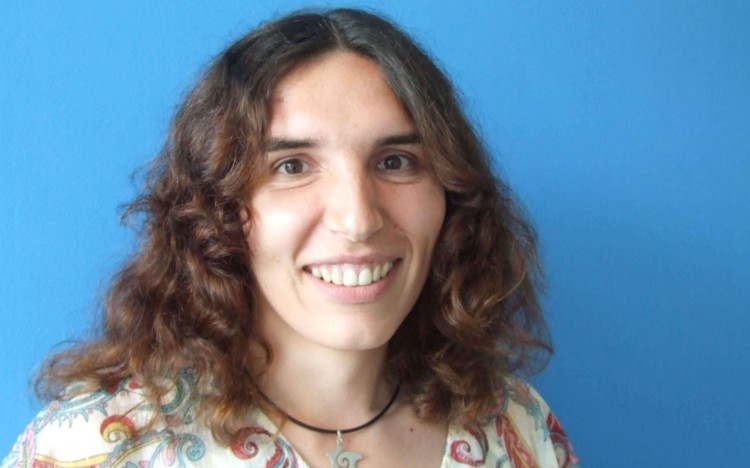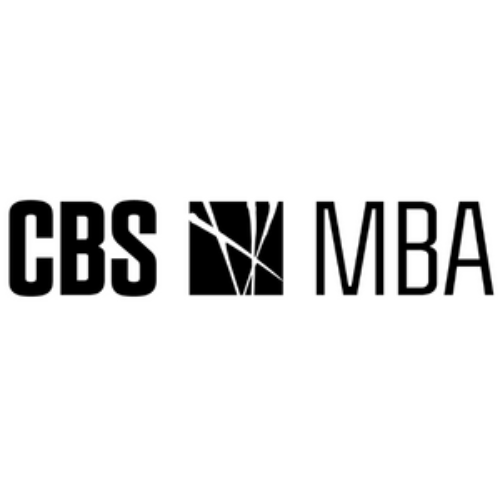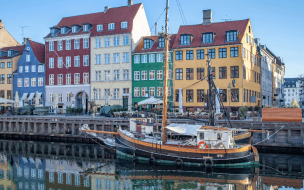Magali Reyes Henkel is using her EMBA to bolster her leadership skills in a new job at an environmental nonprofit
A couple of months ago Magali Reyes Henkel was leading a meeting with her team at environmental nonprofit Bioversity International, where she is director of finance. In the room she was asking them to reflect on why they do what they do, why they joined the team, and what drives them to wake up every morning and get ready for work.Magali remembers the first NGO she worked for, World Vision, in Mexico. She once visited a development project the organization was working on and saw the abject poverty that cripples parts of society worldwide. That confirmed her commitment to a career in nonprofits.
It’s what drives her work at Bioversity, a nonprofit with the mission of safeguarding agricultural biodiversity to achieve sustainable global food and nutrition security.
She always knew at some point in her career an MBA would factor in. She had planned to do one at 25 and had been attending MBA fairs from the age of 23. But, her commitment to her career—which included a period at Greenpeace where she worked all around the world—meant she never had the time.
Now, after accruing enough work experience to qualify for the Global Executive MBA (GEMBA) at , she’s seeing how an EMBA can help you become a better a leader.
The value of the EMBA classroom

The GEMBA program is made up of 15 students, all with diverse backgrounds.
“Every university always talks of diversity,” says Magali (pictured), “and I always thought that was in the sense of nationalities and cultural background.
I’m actually impressed with the cohort, we have people from very different personal backgrounds—we have a lawyer, a molecular biologist, people from NGOs, and pharmaceuticals.”
She adds that the group is coherent and tight, and that they hang out after classes and engage in smart discussions about their respective industries.
When your classmates are CEOs and vice presidents at companies, and have spent their careers overcoming challenges in a multitude of industries, learning from each other goes in lockstep with developing as a better leader.
“I think it really helps to have that high-level profile,” Magali says.
The Global Executive MBA is already helping Magali in her new leadership role at Bioversity International. The actual courses on leadership, she explains, have been invaluable.
“It has provided me with a lot of different theoretical approaches,” she says, “some that I knew because of my background, but with the others it has been helpful to take that and put it into practice in my job.”
On top of her already strong international experience, the GEMBA program is taking Magali around the world too. Students study their 11 one-week modules on four continents, studying in London and Copenhagen, Shanghai, Chicago, and Kampala.
Understanding the way business is conducted in different cultures around the world has an intrinsic link to developing as a better leader; the more you understand about diversity, the easier it is to meander cultural differences.
Why Copenhagen Business School?
Magali’s career has taken her all over the world. For Greenpeace she worked in Mexico, the Netherlands, Japan, and South Korea.
When it came to decide where to do an MBA, Magali was in her post in the Netherlands, in Amsterdam. She admits she considered going to Rotterdam School of Management, but when she visited and spoke to the recruitment team at Copenhagen Business School, the obvious choice prevailed.
“I thought RSM was predominantly Dutch, and I had already experienced that culture. I wanted something new,” she explains.
“The program for RSM I had to be away from work for 15 weeks, but CBS was only 11 weeks.”
It was at the time she was preparing to move to Italy to take up her position with Bioversity International, and the flexibility offered by Copenhagen Business School meant that was the clear choice for her.
That international experience is benefitting Magali in the GEMBA classroom. “It’s something my cohort is appreciating,” Magali explains. “I’m in a place where I’m able to contribute more.
“I can integrate more easily with the group and the teachers because I’m used to so many years of exposure and working with many cultures all over the world.”
The real-life business projects on the GEMBA program are also directly applicable to each student’s organization, having a tangible impact on the way they lead at work.
How the Global Executive MBA will help your career
Initially, Magali thought the main end goal of the program would be the credentials, the matter of having it on her resumé.
“I think at this moment in time I have come to the realization that it’s much more than that,” she says. “It’s a journey, and there are lots of opportunities for self-reflection, and to reassess your career and leadership style.”
She can see already the increased level of confidence and experience she has impacting her career. Magali’s goal is to become an executive director of an NGO, whether on a global or national level.
“The EMBA is going to help in that process for sure,” she says.
But, she warns incoming GEMBA students to make sure they have enough time for relaxation, and down time outside the classroom.
Magali herself is a keen basketball player and follows the NBA closely. She also does yoga, travels, and is an avid scuba diver.
“Being there, in a different atmosphere, helps to clear the mind and that’s fundamental,” she concludes. “Without that it’d be chaos.”
Student Reviews
Copenhagen Business School (CBS)
CBS: efficient international network
CBS has always been ranked among the best universities in Europe and this means that it has become a sign of professionalism and success.
The academic level is great thanks to the good teachers and the atmosphere is proactive and challenging. Lots of events are planned every week and this helps you to find your own way.
CBS is not only a business school, it is a great and efficient international network.
Good academic career
I did my Bachelors at CBS and their academic excellence and career opportunities led me to pursue my Masters in Accounting, Strategy and Control. I was very lucky to go on an exchange in Singapore for one semester it boosted me to get a career in a global firm. I like that it is super modern and has all the facilities for the business student in 2019. Especially, I liked the library and Bitlab where I spent most of my time studying. However, note that it is very demanding and studying here is no joke. Everything is very competitive and you are among the most excellent business students in the country. The interaction with international students helped me to see different perspectives in business and culturally and I was lucky to make friends from any part of the world. CBS is like a brand in Denmark. Every serious business company prioritizes us over any other Danish university and also it is free for European citizens. Overall, I have a very satisfying experience at CBS and I'm looking to continue my academical career even further.
CBS is one of the best!
All I have to say regarding my experience at CBS is that it is AMAZING. Having been tutored by world-class academic staff, I can definitely support that I am receiving the best of quality regarding my studies in Digital Marketing. Staff is very friendly and easy to approach. In addition, the facilities we enjoy are top class and meet any demands. Keep in mind that, EU citizens do not pay any fees. Student life might be non-existent here, but the location of the University in The very center of Copenhagen has a huge variety of choices to offer to students regarding their entertainment. Accommodation might be a problem, but early research of the market can be very useful. In addition, the University promotes diversity. In CBS University you can meet people from the whole world which is quite interesting. I definitely suggest CBS for any student who he's interested in pursuing a career in marketing or business.
The ideal business school
I have been enrolled in this university for 2 semesters. What I took from this experience is that there is nothing better out there for those looking for professional growth while being guided by some of the top-notch professors in Scandinavia. They have a really strong focus in technology and digital transformation and they are up to date to guarantee you land a job in the modern fast-evolving world. They also embrace diversity which means many students come from any part of the world and it takes the entire learning experience to another level. You simply learn from every other student cause everyone has different experiences and background which makes you open your mind and see the world from a different angle. In Denmark, even businesses prioritize people who graduate from CBS as it's commonly perceived as the most prestigious university for business graduates.
A Place of Personal Growth
In CBS you can expect an environment of proactive thinking and growth.
The university staff is always open to help and to debate. The teaching methods balance theoretical knowledge and practical skills enabling the student with capacity and confidence to enter the job market successfully. The existence of students from all over the world stimulates discussion and promotion of different cultures, ideas and perspectives. I highly recommend this university for students in business-related areas.
Environment
The environment here is really great. Despite the well organized buildings and libraries, there are also places for students to just stay and relax also even study in the corners of each campus. The professors are mostly really nice and try to interact with students a lot. So, to sum up, the environment is really nice for studying here.
Quality education
Quality education where it emphazises the importance of academic. No finger to put on this aspect of the school.
However, sometimes the administration and IT can be lacking a bit, but in general a really good choice for education!
Best Time!
Classes are challenging and conducted in a professional manner. CBS offers a wide range of possibilities to develop outside of the classes! Libraries and other facilities on the campus are very well adjusted to the student needs.
A heavily theory-based curriculum combined with an ever-stimulating environment
I am currently a Master student at CBS, but I have also completed a Bachelor's Degree in this university. I am quite satisfied with my studies and the teaching level. However, when compared to other business schools, it becomes apparent that most courses at CBS strive to find a good balance between theoretical insight and real-life examples. Compared to my exchange university, the projects that I have found myself writing at CBS have a far less practical application and also leave little room for creativity. If the teaching is heavily theoretical, on the bright side, the university arranges a number of events throughout the year to encourage students to apply their knowledge, in the form of career fairs, case competitions, and other events organized by student associations. In my experience, teachers are very easily approachable and happy to answer your questions. A foreign student like me will find a more international environment at Master level, since the number of international (or at least non-Scandinavian) students enrolled in the Bachelor programs is quite low. However, all communication (both oral and written) from teachers and the university offices is always in English. Administrative offices, student guidance services, the career center, and the international office are definitely worth a mention. All of the requests that I have had throughout the years have always been met with kindness, promptness and efficiency.
CBS: efficient international network
CBS has always been ranked among the best universities in Europe and this means that it has become a sign of professionalism and success.
The academic level is great thanks to the good teachers and the atmosphere is proactive and challenging. Lots of events are planned every week and this helps you to find your own way.
CBS is not only a business school, it is a great and efficient international network.
Good academic career
I did my Bachelors at CBS and their academic excellence and career opportunities led me to pursue my Masters in Accounting, Strategy and Control. I was very lucky to go on an exchange in Singapore for one semester it boosted me to get a career in a global firm. I like that it is super modern and has all the facilities for the business student in 2019. Especially, I liked the library and Bitlab where I spent most of my time studying. However, note that it is very demanding and studying here is no joke. Everything is very competitive and you are among the most excellent business students in the country. The interaction with international students helped me to see different perspectives in business and culturally and I was lucky to make friends from any part of the world. CBS is like a brand in Denmark. Every serious business company prioritizes us over any other Danish university and also it is free for European citizens. Overall, I have a very satisfying experience at CBS and I'm looking to continue my academical career even further.
CBS is one of the best!
All I have to say regarding my experience at CBS is that it is AMAZING. Having been tutored by world-class academic staff, I can definitely support that I am receiving the best of quality regarding my studies in Digital Marketing. Staff is very friendly and easy to approach. In addition, the facilities we enjoy are top class and meet any demands. Keep in mind that, EU citizens do not pay any fees. Student life might be non-existent here, but the location of the University in The very center of Copenhagen has a huge variety of choices to offer to students regarding their entertainment. Accommodation might be a problem, but early research of the market can be very useful. In addition, the University promotes diversity. In CBS University you can meet people from the whole world which is quite interesting. I definitely suggest CBS for any student who he's interested in pursuing a career in marketing or business.
The ideal business school
I have been enrolled in this university for 2 semesters. What I took from this experience is that there is nothing better out there for those looking for professional growth while being guided by some of the top-notch professors in Scandinavia. They have a really strong focus in technology and digital transformation and they are up to date to guarantee you land a job in the modern fast-evolving world. They also embrace diversity which means many students come from any part of the world and it takes the entire learning experience to another level. You simply learn from every other student cause everyone has different experiences and background which makes you open your mind and see the world from a different angle. In Denmark, even businesses prioritize people who graduate from CBS as it's commonly perceived as the most prestigious university for business graduates.
A Place of Personal Growth
In CBS you can expect an environment of proactive thinking and growth.
The university staff is always open to help and to debate. The teaching methods balance theoretical knowledge and practical skills enabling the student with capacity and confidence to enter the job market successfully. The existence of students from all over the world stimulates discussion and promotion of different cultures, ideas and perspectives. I highly recommend this university for students in business-related areas.
Environment
The environment here is really great. Despite the well organized buildings and libraries, there are also places for students to just stay and relax also even study in the corners of each campus. The professors are mostly really nice and try to interact with students a lot. So, to sum up, the environment is really nice for studying here.
Quality education
Quality education where it emphazises the importance of academic. No finger to put on this aspect of the school.
However, sometimes the administration and IT can be lacking a bit, but in general a really good choice for education!
Best Time!
Classes are challenging and conducted in a professional manner. CBS offers a wide range of possibilities to develop outside of the classes! Libraries and other facilities on the campus are very well adjusted to the student needs.
A heavily theory-based curriculum combined with an ever-stimulating environment
I am currently a Master student at CBS, but I have also completed a Bachelor's Degree in this university. I am quite satisfied with my studies and the teaching level. However, when compared to other business schools, it becomes apparent that most courses at CBS strive to find a good balance between theoretical insight and real-life examples. Compared to my exchange university, the projects that I have found myself writing at CBS have a far less practical application and also leave little room for creativity. If the teaching is heavily theoretical, on the bright side, the university arranges a number of events throughout the year to encourage students to apply their knowledge, in the form of career fairs, case competitions, and other events organized by student associations. In my experience, teachers are very easily approachable and happy to answer your questions. A foreign student like me will find a more international environment at Master level, since the number of international (or at least non-Scandinavian) students enrolled in the Bachelor programs is quite low. However, all communication (both oral and written) from teachers and the university offices is always in English. Administrative offices, student guidance services, the career center, and the international office are definitely worth a mention. All of the requests that I have had throughout the years have always been met with kindness, promptness and efficiency.









